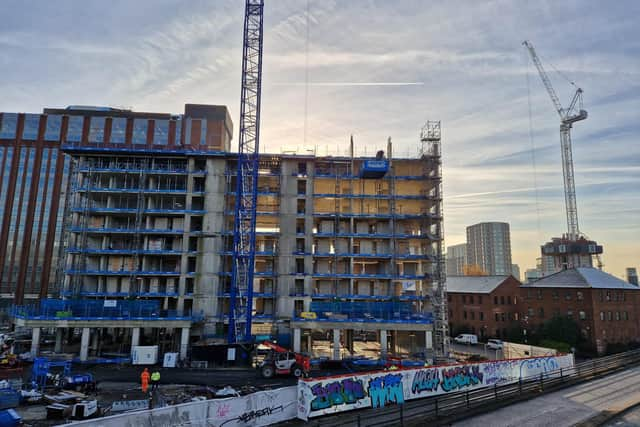Leeds named among the UK's worst affected cities for construction noise as council unveils number of complaints
and live on Freeview channel 276
The city has received over 600 search queries related to construction noise per month; reaching for information on noise regulations, and most likely complaining. Searches in Leeds were over four times that of searches in other parts of the country, research by London plant hire specialists at Herts Tools found.
This perhaps comes as no surprise considering Leeds has delivered 16,249 homes since 2018 and was responsible for 2.2% of England's housing supply in 2021.
Advertisement
Hide AdAdvertisement
Hide AdLeeds City Council has said that it has received 116 noise complaints in 2023, after 149 were received last year.


According to a city tower crane count last year, construction activity in Leeds city centre has soared to its highest level since 2007.
The noise-averse may wish to avoid the north of the UK as the study on construction noise found that Manchester, Liverpool and Newcastle follow Leeds, London and Huddersfield as the noisiest areas for construction. All of the cities have over 500 monthly noise complaint searches.
According to the latest noise complaint report, the average number of general noise complaints per 1000 people in Leeds was 9.3. In comparison, Birmingham received just 5.8; Devon, 5.1 and Bristol, 3.1.
Advertisement
Hide AdAdvertisement
Hide AdHerts Tools analysed the number of monthly Google searches for queries related to noisy construction work in different cities across the UK.
With recent reports suggesting that noise pollution, including noise from construction work, is the second-largest environmental threat to well-being, it’s essential that construction firms abide by noise guidelines to limit disruption - particularly in the areas worst hit.
Responding to the findings, a Leeds City Council spokesperson said, “So far in 2023 we have received 116 noise complaints related to construction projects, in 2022 this number was 149. When the council receives complaints in relation to construction noise we will engage with the developer to ensure they are operating within the limits of their planning permission and are using all best practicable means to prevent unnecessary noise. The council will always look to find a fair balance between the needs of the developer to carry out the works and the rights of neighbours to the quiet enjoyment of their properties.
“The last two years have been very strong for the property market in Leeds, with record-breaking levels of development in 2021 followed by similar levels in 2022. This is alongside some of the largest infrastructure investments in Leeds for 50 years, and as the city centre grows year-on-year we continue to attract leading businesses and major investment.”
What are the rules and regulations around building work?
- Building work in the UK must be in accordance with the 1974 Pollution Control Act, which aims to protect the public against noise pollution. This act limits noisy work to between 8 am and 6 pm from Monday to Friday. Any work done outside these times must be that which is not noisy, for example setting up for the day ahead or tidying up the site after work.
- The kind of work which is considered noisy and is, therefore, time-limited under these laws is usually any task involving the use of hand or power tools and the erection or dismantling of scaffolding or walls.
- The rules around building work are different at the weekend, with greater limits on what work can take place. Generally, on a Saturday, building work can take place between 8 a.m. and 1 p.m.
- The rules around working on a Sunday are generally more restrictive, with most areas prohibiting noisy work. This also usually applies to Bank Holidays.
- There may also be circumstances which make it impossible to do the work during normal working hours, for example, work on train tracks, which can often only be done at night when the trains aren’t running.
